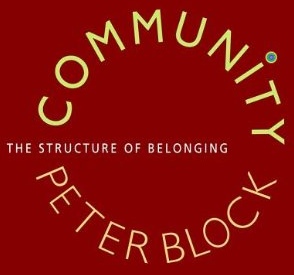Connecting the insights of Peter Block on community transformation to the path of Social Architecture. The moral of the story: we are not problem solvers, but capacity builders!
In his 2009 book Community: the Structure of Belonging, Peter Block explores how community can emerge from fragmentation. He goes into great depth on how community is built, developed and what we can do to transform our communities. The book is a gem – like most of his work.
Last week I argued that we need to understand the stages of community development before we start. Remember, our final goal is sustainable change. Until now, my best guess is that we need to balance compliance and community in order to arrive at a social architecture.
After reading Block’s book for the 4th time (no kidding) I’m starting to understand that it contains the ingredients for making sustainable change actionable. He makes some distinctions that are useful on the path of community development.
A first distinction resides on the individual level:
- Accountability is the willingness to take care of the whole. In other words, accountability is about taking ownership.
- Entitlement is a conversation about what others can do to create the future for us. This means that entitlement is more related to being a victim as opposed to ownership.
A second distinction is about how this plays out on the level of a community. The attitude of entitlement creates an atmosphere of retribution, whereas the attitude of accountability creates a space where things become possible. Quoting Block on this one:
The future of community becomes a choice between a retributive conversation (a problem to be solved) and a restorative conversation (a possibility to be lived in to).
A third distinction is about projection. This is a distinction that may be far-fetched at first sight, and difficult to get our arms around, but it bears the essence for transforming community. Again, quoting Block on how projection plays out in community:
We project onto leaders the qualities and disappointments that we find too much to carry ourselves.
Projection shows up in communities through the conversations that focus on any of the needs, problems, and diagnostic categories through which we label others.
Projection sustains itself in the absence of relatedness.
According to Block the key to communal transformation resides in taking back our collective projections. By the way, this is not done with Freudian sessions on a couch with a shrink. To the contrary, we need to get out of our isolation and invite people into conversations that ask them to act as creators or owners of the community. Here are the two conditions for communal transformation that Block proposes:
- When we produce deeper relatedness across boundaries, and
- When we create new conversations that focus on the gifts and capacities of others.
A logical conclusion is that our work is to build the capacity of community members to be accountable and to become creators of community.
Read that again. Really slowly. Our job as organizational change practitioners is to build the capacity for people to be owners and to capitalize on their assets. This stands in contrast with our traditional view of a change leader, i.e.: a problem solving expert, focussed on deficiencies and not an inch interested in building a platform, looking for ambassadors and all the other pains on the path of social architecture.




Pingback: Getting Serious about Community Development (Part 3) | Reply-MC()
Pingback: Getting Serious about Community Development (Part 2) | Reply-MC | Organization Survival Playbook | Scoop.it()
Pingback: Getting Serious about Community Development (Part 6) | Reply-MC()